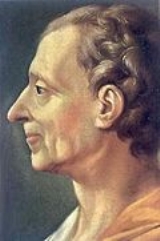
Charles de Secondat, baron de Montesquieu
Overview
Charles-Louis de Secondat, baron de La Brède et de Montesquieu (ˈmɒntɨskjuː, mɔ̃tɛskjø; 18 January 168910 February 1755), generally referred to as simply Montesquieu, was a French
social commentator and political thinker
who lived during the Enlightenment
. He is famous for his articulation of the theory of separation of powers
, taken for granted in modern discussions of government
and implemented in many constitution
s throughout the world. He was largely responsible for the popularization of the terms feudalism
and Byzantine Empire
.
He was born at the Château de la Brède
in the southwest of France.
France
The French Republic , The French Republic , The French Republic , (commonly known as France , is a unitary semi-presidential republic in Western Europe with several overseas territories and islands located on other continents and in the Indian, Pacific, and Atlantic oceans. Metropolitan France...
social commentator and political thinker
Political philosophy
Political philosophy is the study of such topics as liberty, justice, property, rights, law, and the enforcement of a legal code by authority: what they are, why they are needed, what, if anything, makes a government legitimate, what rights and freedoms it should protect and why, what form it...
who lived during the Enlightenment
Age of Enlightenment
The Age of Enlightenment was an elite cultural movement of intellectuals in 18th century Europe that sought to mobilize the power of reason in order to reform society and advance knowledge. It promoted intellectual interchange and opposed intolerance and abuses in church and state...
. He is famous for his articulation of the theory of separation of powers
Separation of powers
The separation of powers, often imprecisely used interchangeably with the trias politica principle, is a model for the governance of a state. The model was first developed in ancient Greece and came into widespread use by the Roman Republic as part of the unmodified Constitution of the Roman Republic...
, taken for granted in modern discussions of government
Government
Government refers to the legislators, administrators, and arbitrators in the administrative bureaucracy who control a state at a given time, and to the system of government by which they are organized...
and implemented in many constitution
Constitution
A constitution is a set of fundamental principles or established precedents according to which a state or other organization is governed. These rules together make up, i.e. constitute, what the entity is...
s throughout the world. He was largely responsible for the popularization of the terms feudalism
Feudalism
Feudalism was a set of legal and military customs in medieval Europe that flourished between the 9th and 15th centuries, which, broadly defined, was a system for ordering society around relationships derived from the holding of land in exchange for service or labour.Although derived from the...
and Byzantine Empire
Byzantine Empire
The Byzantine Empire was the Eastern Roman Empire during the periods of Late Antiquity and the Middle Ages, centred on the capital of Constantinople. Known simply as the Roman Empire or Romania to its inhabitants and neighbours, the Empire was the direct continuation of the Ancient Roman State...
.
He was born at the Château de la Brède
Château de la Brède
The Château de la Brède is a feudal castle in the commune of La Brède in the département of Gironde, France.The castle was built in the Gothic style starting in 1306, on the site of an earlier castle. It is surrounded by water-filled moats and an English garden, in the centre of a Bordelais vineyard...
in the southwest of France.
Unanswered Questions

